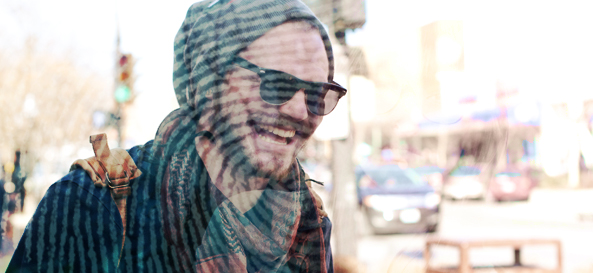
When my husband and I moved, we had the opportunity to meet a lot of new people—which means we found ourselves in a lot of small talk.
Heightened in awareness to my surroundings in the way that only newness can make you, I have become incredibly conscious of the way I try to present myself to others, and of the guards I put up in my heart and mind. Struggling to move in my heavy armor of facade, I try to put my best foot—and face—forward, in the hopes that I will be accepted.
I’ve noticed a pattern in the way these conversations start as the battle of first impressions begins. It starts with a seemingly harmless and simple exchange of names, and already, we are judging each other by our association of others with the same name. Then—suddenly—things take a serious turn.
Swords are drawn, and defenses go up as the inevitable question is asked: “So, what do you do?”
The opponent is not looking for a list of hobbies, for preferences in food, for the number of “likes” their last photo upload received on Facebook.
What they really want to know is who you are, as defined by the work providing your paycheck.
The blow is deflected with a lift of the shield and a response of what that person does from the hours of 9 to 5:
“I’m a lawyer.”
“I’m a doctor.”
“I’m a teacher.”
“I’m a firefighter.”
The responses to this tell-all question are positioned so that the person speaking no longer just “does” law work—he or she is a lawyer. One no longer practices medicine, one wears the occupation like a garment.
And so, on the field of first impressions, the sword is dropped and the hand is extended—for their worth has been proven by what they do.
They each breathe a sigh of relief, for their fragile armor has not been poked and shattered. They can continue wearing their occupations as identities and as a badge of honor—a sign that their biggest fear has not come true- they are more than nothing.
And under that badge of professional accomplishment is where I’ve always hid, helping me to deflect that inevitable question of what I do with a series of impressive statements. But now, it seems that I left my shield of protection at my wedding reception along with my now dried flower bouquet. As a newlywed in a new town, I’m realizing how feeble my responses sound as I try to justify what I do to those I most want to impress.
“I do laundry?”
“I’m learning to cook?”
“I make crafts for my home?”
I am greeted with blank stares. The sword pierces my skin and I fight to hide the pain. I continue with resigned sigh: “I’m looking for a job.”
The tension clears, and the sword is put down in exchange for sympathetic smiles and condescending suggestions of openings. And underneath it all, there is an unshakable discomfort—a growing desperation on both sides that I find something, and quickly, so that I can be someone of value once again.
When did we start relying on this cycle of doing to give us meaning?
In The Way of the Heart, Henri Nouwen exhorts Christians to leave our comforts of jobs and doing, and to spend time alone in solitude. In solitude, there’s no need to wear the badge of our achievements. In solitude, we don’t need to hide behind our schedules and to-do lists. We are forced to put down the armor, and face who we actually are, without defense or pretense. Nouwen describes the personal crisis that follows:
“In solitude I get rid of my scaffolding: no friends to talk with, no telephone calls to make, no meetings to attend, no music to entertain, no books to distract, just me—naked, vulnerable, weak, sinful, deprived, broken—nothing. It is this nothingness that I have to face in my solitude—a nothingness so dreadful that everything in me wants to run to my friends, my work and my distractions, so I can forget my nothingness and make myself believe that I am worth something.”
When we willingly enter a time of less—less busyness, less phone calls, less meetings, less overall to do—we will likely discover that the rush to achieve has caused us to be content with a lesser sense of purpose. Many of us thrive in the middle of everything, hating to miss out on any kind of excitement. Yet, in doing so, we often hold high our schedules, projects and occupations as trophies, and derive our purposes from them.
But what if our purpose doesn’t actually lie in what we do? What if our purpose is found in who we are?
What if we stepped out of our broken armor and took a good long look in the mirror of truth? What if we took all of our nothingness, our meaningless, and our fear of never being valuable, and took it to the only One who can actually give me value?
Nouwen suggests that the point of solitude—of letting go—is to meet our Lord and be with Him alone, with our sin unhidden, but His grace singing louder. And in that sweet tune He sings to us, we find we’re not addressed as teacher, or cleaner, or unemployed, but as daughters and sons—a far cry from worthless.
Nouwen writes,
“Our primary task in solitude, therefore, is not to pay undue attention to the many faces which assail us, but to keep the eyes of our mind and heart on him who is our divine savior. Only in the context of grace can we face our sin; only in the place of healing do we dare to show our wounds…. And we can slowly begin to experience the freedom of the children of God.”
I find myself fighting the battle, with others and within myself, to be something. We all do. But I’m learning that the way to this being is not by constant, distracted doing. And so, one by one, I let go of these trophies of doing, and find my heart is lighter than it was when I gripped to them so tightly. My worth, it seems, was completely independent of these trophies all along.
I will continue to introduce myself to new people in my new place in life. But it will no longer be in desperation, in search of approval. I stand without my armor, unafraid of the sword, and present myself as I am: splendidly imperfect, impossibly forgiven, unquestionably Worthwhile.






















